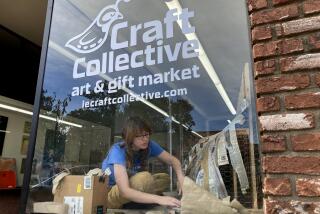Drop-Off Stores Let EBay Users Bid Hassles Goodbye
- Share via
BERKELEY — Joan Spiegel, a retired psychologist who acknowledges being an Internet neophyte, was intrigued by the idea of selling some framed prints on EBay Inc.’s online auction Web site without any technical hassle.
Standing inside a store in Berkeley, she listened to a clerk explain that everything would be taken care of. For a commission, the store’s staff would take photographs of the prints, list them for auction on EBay, respond to questions, collect payment and ship the prints to the winning bidders.
“I’m going to bring in one print and try this out,” Spiegel said.
Welcome to one of the latest businesses to piggyback on the EBay phenomenon -- EBay drop-off stores. These shops enable customers to drop off their unwanted items and have professionals take care of auctioning the goods online.
Several such stores have been opened across the country in the last few months by entrepreneurs who believe that there is a big appetite for the service.
The question is whether the public really wants their help. San Jose-based EBay already is deluged with users, making it one of the Internet’s biggest successes.
Kevin McGinnis, who co-owns Picture It Sold in Berkeley with his wife, Erin, said the lure of his shop is convenience.
“Buying on EBay is easy, but selling isn’t,” said McGinnis, whose store opened in August. “You have to be really well- acquainted with a digital camera, and you have to be acquainted with a computer.”
Auctioning items on EBay on behalf of others isn’t a new idea. People have listed merchandise for their family and friends for years.
Professionals have filled a similar role for a commission. EBay estimates that there are nearly 25,000 of these so-called trading assistants, who generally work at home and are self-employed.
The clear leader in the nascent field of drop-off stores is AuctionDrop, based in San Carlos, south of San Francisco. It has opened three Bay Area locations -- in San Carlos, Menlo Park and Los Altos -- and has raised $3 million in financing, most of it from private investors led by Mobius Venture Capital and Draper Associates.
The stores feed their goods to a warehouse in San Carlos. Once they are taken off trucks and inspected, the items are moved along a system of conveyor belts.
The first stop is at one of several photography stations. Farther down the line, Suzy Kunda-Cvitkovic, a specialist in jewelry, silver and porcelain, was examining a set of flatware at her desk and writing up the description.
“I don’t put down anything that I can’t prove,” she said.
Items in the warehouse included bicycles, a pay telephone, a “Star Wars” R2D2 ice cooler, dolls, a saddle, truck tires, computers, laboratory equipment and an artificial cadaver.
Another chain, QuikDrop, which has stores in California, Oregon, Texas and Alabama, is selling franchises.
EBay drop-off stores charge commissions, generally 35% to 40% of the final sale price.
Basic service generally includes a seven-day auction featuring photographs and bidding beginning at $1. The stores charge more for extras, such as setting a higher minimum bid, selling at a fixed price or creating an auction that lasts longer than seven days.
The model is similar to that of consignment stores in the offline world. The difference is that items listed on EBay reach a potential 34 million active users.
EBay is not involved in the drop-off stores business.
“We’re going to keep an eye on it,” company spokesman Kevin Pursglove said. “And at some point, if we feel there is some way we can work with these companies and make them better EBay sellers, we will.”
EBay has reason to be cautious. Although AuctionDrop reports having sold 6,000 to 7,000 items since March and racking up $600,000 to $700,000 in total sales, the revenue generated so far has yet to cover the cost of the investment in its San Carlos warehouse.
More to Read
Inside the business of entertainment
The Wide Shot brings you news, analysis and insights on everything from streaming wars to production — and what it all means for the future.
You may occasionally receive promotional content from the Los Angeles Times.










